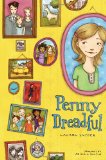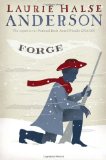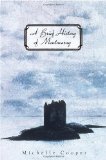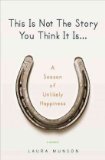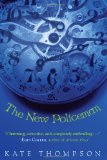Review of Enchanted Ivy, by Sarah Beth Durst
by Sarah Beth Durst
Margaret K. McElderry Books (Simon & Schuster), New York, 2010. 310 pages.
Starred Review
2010 Sonderbooks Stand-out: #7 Teen Fantasy Fiction
I wonder if admission applications will increase for Princeton now that this book has been published. If I were reading it in high school, I would definitely have put Princeton at the top of my college wish list as a result. I love the author’s statement at the start of the acknowledgements:
“Yes, I went to Princeton. I went because of the trees. Junior year of high school, I walked onto campus, saw the arch of elm trees, saw the massive oaks, and I was sold. Perhaps not the best way to choose a college, but that’s the way it happened. Anyway, that moment changed my life and inspired this book.”
I love the whole premise of an enchantment with a door to a parallel magical world at Princeton. After all, who hasn’t looked at gargoyles and wondered about their secret lives?
The book begins as Lily’s Grandpa is driving her and her mom to Princeton University.
“Normally, Mom avoided car rides altogether, but this wasn’t a normal weekend. It was Princeton Reunions Weekend. Reunions weekend! Lily couldn’t believe Grandpa had offered to take them. He always attended, even in off years like his forty-ninth reunion. It was his “thing,” his once-a-year break from mothering both Lily and Mom. But this year, he’d said that Lily should see her future alma mater.
“Not that she’d even applied yet. She was a junior, three weeks away from her final exams, but Grandpa claimed this place was her destiny. No pressure, though. Yeah, right.”
Grandpa takes her to the Vineyard Club, the most exclusive eating club at Princeton. Grandpa had been a member fifty years ago. The members of the Vineyard Club have been expecting her. They ask her if she’s ready for the Test. If she passes, she is guaranteed admission to Princeton.
“One of the perfect-posture women said, ‘If you fail, you are free to apply with the rest of the applicants. This test is outside the purview of the admissions committee. But if you fail here, you should not expect an invitation to join Vineyard Club. Indeed, you would not be welcome.’
“Success meant her dream come true; failure meant exclusion from this (admittedly nice) clubhouse but still a shot at her dream come true. Yeah, she could totally live with that. No wonder Grandpa was smiling so widely he looked like he might burst. She felt the same expressions spreading across her face. She was smiling so hard that her cheeks ached. She felt as if a hundred birthday presents, including the pony she’d wanted in third grade and the lime green Volkswagen she wanted now, had landed right in front of her. ‘What’s the Ivy Key?’ she asked. ‘What does it look like? What does it open? What do I do to find it? How do I start?’
“At her flood of questions, Mr. Mayfair and several others smiled indulgently.
“‘That’s the test, my dear,’ the man with the book said.”
Lily decides to take a campus tour to get her bearings and maybe learn something about what could be the key, when a boy with orange and black hair (Princeton’s colors) named Tye joins her and says he’s her guard. Then she sees a gargoyle wave at him, and she’s sure it’s rigged. She is NOT going crazy, like her mother. The gargoyle drops a clue.
And after she makes a trip to the library where she discovers something interesting about her father, a monkeylike creature attacks her, but Tye — and some ivy vines — saves her.
I like the scene where she talks to another gargoyle:
“She bent sideways to look underneath the gargoyle for a microphone and speaker. She didn’t see anything. ‘Mr. Ape,’ Lily said in an even voice, ‘are you talking?’ She wasn’t going to let the Old Boys rattle her this time. They’d rigged another gargoyle somehow.
“‘Professor Ape, if you please,’ the gargoyle said in the same soft-as-sand voice. ‘I have tenure.’ He chuckled as if he’d made a joke.
“‘Nice to meet you, Professor Ape,’ she said. ‘So am I talking through a microphone to someone in Vineyard Club, or is this a recording? Are you interactive?’
“The gargoyle sighed. ‘I would appreciate it if we could dispense with all the “you’re joking” and “this can’t be true” and “I must be dreaming” nonsense. Can we simply agree that I’m a magical being from a parallel world and pronounce this lesson done?'”
As Lily’s quest for the key continues, there turns out to be far, far more at stake than just her admission to Princeton. The fate of thousands of people, perhaps the world, is at risk. And she has questions about her father’s death and her mother’s mental problems. Something isn’t right, and it may get much, much worse.
I enjoyed every moment of reading this book, which sadly didn’t last too long, since I kept reading until I finished in the wee hours of the morning. Perhaps it was because I love stories where things that seem magical turn out to truly be magical, where there end up being doors to a parallel, enchanted world. Oh, and I don’t think it’s too much of a spoiler to say that a were-tiger boyfriend sounds so much cuddlier than a cold, hard vampire. I mean, if you’re going for a paranormal romance, I don’t think you could do much better than a were-tiger.
I’m afraid there was one small error that glared at me, though not everyone would notice. The clue the gargoyle drops is a library call number — but it’s wrong. Not that it’s the wrong Dewey Decimal number, but college and university libraries rarely use Dewey Decimal numbers. They use LC (Library of Congress) numbers, an entirely different classification system. Of course I noticed right away that it was a call number, but I also noticed right away that it would never work to find a book in a Princeton library. I checked online today and sure enough, Princeton University Library uses the LC classification system. But this was a very small error in a fantastic book.
Now let’s see if I can talk my son into applying to Princeton.
a href=”http://www.amazon.com/exec/obidos/ASIN/1416986456/sonderbooksco-20″ target=”outside”>Buy from Amazon.com
Find this review on Sonderbooks at: www.sonderbooks.com/Teens/enchanted_ivy.html
Disclosure: I am an Amazon Affiliate, and will earn a small percentage if you order a book on Amazon after clicking through from my site.
Source: This review is based on a book sent to me by the author.

